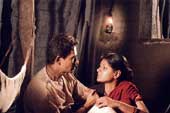 |
| Atul Kulkarni, Nandita Das in Maati Maay; (below) Chitra Palekar, Debu Deodhar |
 |
Chitra Palekar?s bond with Bengal keeps growing stronger. In the 70?s, while working with Satyadev Dubey in Mumbai, she played the lead in Mohit Chattopadhyay?s Rajrakt. Badal Sircar has been her greatest inspiration and her performances in Rashomon and Pagla Ghoda on the Calcutta stage are still remembered.
Akriet, the first film produced by her premiered at the Calcutta International Film Festival. And now, for her directorial debut, she has adapted Mahasveta Devi?s story Baayen. The Marathi film entitled Maati Maay has Palekar in the triple role of producer, scriptwriter and director.
?It was Usha (Ganguli) who introduced me to the story asking me to build it into a play,? Palekar told Metro from Mumbai. ?But as I was reading it, I began visualising the story in the film format. I lived with the story for two years before approaching Mahasvetadidi for the rights.?
After NFDC admitted a financial crunch, Palekar decided to produce it herself. She did have 25 years of experience in the field to back her. She has scripted several important films and serials (Kairee, Kacchi Dhoop, Naquaab, Thodasa Roomani Ho Jaye...) directed plays; produced and co-directed films. So, roping in a cinematographer like Debu Deodhar and editor like Hemanti Sarkar was not difficult.
Actors Atul Kulkarni (last seen in Rang De Basanti) and Nandita Das, who play the lead, were, ?genuinely excited to be part of the film?. The location posed a problem, but after a lot of scouting, Chitra found the perfect location in Amaravati ?where the predominate colours were the variegated browns of dry leaves... the backdrop needed to build up the mood and tell this tale of injustice and insensitivity.?
This is a film without villains and there is no class conflict either. ?The villain here is the social system. It is ignorance, superstitions and basic insensitivity that condemns a woman to a life of loneliness and misery. It is a period piece in a way. The story is set 40-50 years back but I have had to make no changes because things haven?t changed for women all that much. There is a redeeming factor in the woman?s son,? said Chitra.
But why choose to do it in Marathi? ?Because the story is universal and because I am comfortable in Marathi. Regional languages add a special dimension to such stories and nowadays one can always add English subtitles for other regions,? smiled Chitra.
Nandita Das had only good things to say about the film-maker and the film: ?It is rare to be working with people who are so committed. Shooting in that arid location was tough and speaking Marathi, that too a typical village dialect wasn?t easy. But nothing matters really if you believe in the work you are doing. Chitra is very talented and the story is very powerful,? she said between her Padakhkhep schedules in Calcutta. ?The film,? said Nandita ?describes the journey of a woman who buries dead babies for a living and is also a mother.?
Does this mean goodbye to theatre for Chitra? ?No, I love the stage and have been conducting workshops for children for a long time but right now all my time is taken up by Maati Maay,? said the director. The film is slated for release some time in May.











